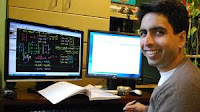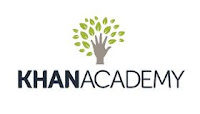From In The Business of Technology
Ever since quitting his job as a successful hedge-fund analyst to dedicate himself full time to this, Khan has
managed to win fans worldwide and goad skeptical educators. His simply narrated, faceless home videos on
everything from algebra to French history have been viewed half a
billion times. Last year, a number of schools began “flipping” their
classrooms, having students study Khan videos by night and do homework
with teachers by day.
Khan
says that his educational videos are all about
taking the stress out of learning and making concepts approachable. He
began the educational videos to help his family. “(The
videos) feel like I’m sitting next to you at the kitchen table and
they’re very conversational, off-the-cuff sometimes. And I think that’s
kind of caught on a little bit,” he said. “People feel, when you learn
something, it’s a very stressful experience. I think people have under
emphasized how important tone is and not being condescending and being
very conversational. I think that and the breadth of the content that’s
there has gotten people engaged.”
fueled the debate over tech’s growing influence on education while
garnering the support of powerful friends. “At
3,000 lessons online, Sal’s personal ability as a teacher is
remarkable,” says Bill Gates, whose mention of Khan Academy at a
conference in Aspen, Colo., in 2010 put the website on the map.
“Bringing this kind of creativity and new assessment tools for teachers
could make a profoundly positive difference in education.”
Khan explains the
philosophy and differentiates between learning and credentials
associated with it. “If you think about what education is, it’s a
combination. There’s a
learning part. You learn accounting, you learn to write better, to
think, whatever. Then there is a credentialing part, where I’m going to
hand you something that you can go take into the market and signal to
people that you know what you’re doing. Right now they’re very muddled,
but this whole online debate or
what’s happening now is actually starting to clarify things. At Khan
Academy we’re 100% focused on the learning side of things.”
However Khan Academy does face a problem – the majority of world Internet users aren’t fluent English speakers. For
Khan Academy, the answer is obvious: Translate content, using the
Internet as its translators. The donation-funded non-profit has spent the past few years
systematically porting their lectures and tests into over 16 foreign
languages. Volunteer workers crowdsourced from the Internet work closely
with Khan Academy supervisors to create subtitles for lectures, along
with voiceovers for select videos. Khan Academy also plans to add original foreign language
content–lectures and chats conducted from start to finish in
non-English languages with no translation involved.
The Khan Academy are now inviting prospective pupil to spend two weeks at the Khan Academy Discovery Lab this
summer. Also planning an in-person session in Palo Alto, California for
campers who are curious about the world and have a hunger to learn and
explore. They promise hands-on projects in Math, Science and Economics,
explore robotics and engineering, and much more. They think that this Discovery Lab will allow them to show innovative ways to integrate
technology into the hands-on learning experience.
The Academy does have it’s fair share of critics too but it is reasonable to conclude that Sal Khan has potentially changed the way education method for next generation of students.
References, sources and credits for this article:

